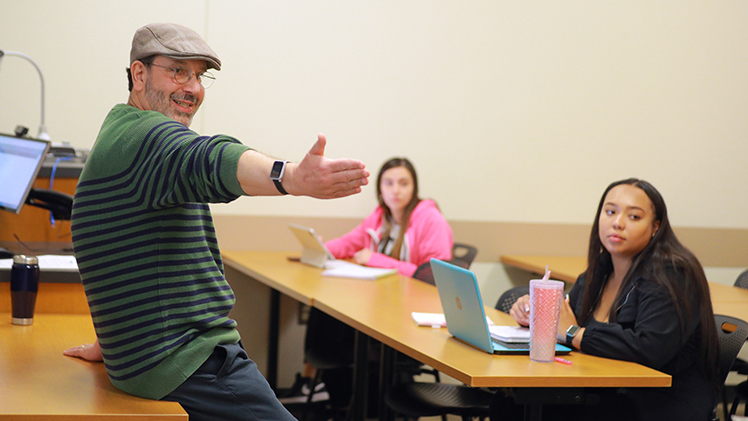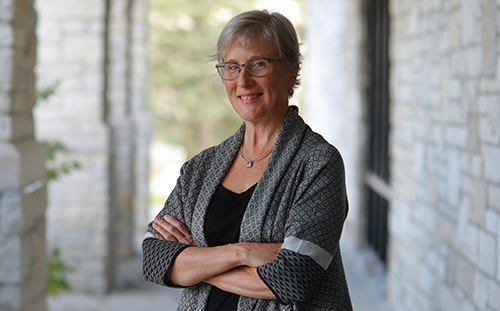What’s the best classroom at The University of Toledo?
It’s one that’s not on campus at all, said senior Madelyne Stiegler. The best classroom, she said, is inside the Toledo Correctional Institution.

Dr. Jerry Van Hoy teaches an introductory Law and Social Thought Gateway course on Aug. 30. Van Hoy and Dr. Renée Heberle are co-directors of the undergraduate program that teaches the study of law in the context of the liberal arts.
Stiegler, of Allen Park, Mich., can speak from experience: She’s taken courses at the local men’s facility twice through the Inside-Out Prison Exchange Program, each time learning alongside more than a dozen inmates-turned-classmates.
“It is one of the greatest classes that UToledo has to offer,” Stiegler said. “I think everyone should be taking a class like it.”
The Inside-Out Prison Exchange is popular among students, like Stiegler, who are majoring or minoring in Law and Social Thought. An undergraduate interdisciplinary program at UToledo, Law and Social Thought places students in classrooms across campus — and in some cases off campus — on the argument that law should be studied in the context of the liberal arts: students learn to appreciate the connections between law and society, politics, language, history and power.
Law and Social Thought was the only undergraduate program of its kind in Ohio when it launched at UToledo in 2000, and it became a founding member of the Consortium of Undergraduate Law and Justice Programs in 2003.
Co-directors Dr. Renée Heberle and Dr. Jerry Van Hoy said the program continues to stand out among the many pre-law programs that approach law from a professional perspective. That’s in large part due to its liberal arts focus and the high degree of engagement asked of students.
Students not only select their own courses individually, with guidance from Van Hoy and Heberle as advisors, but also weigh in on the direction and decisions of the program as a whole. The co-directors turn to them for input on which courses are offered, which speakers are brought to campus and more.
“They’re an extremely active group of students,” said Heberle, also a professor of political science and coordinator of the Inside-Out Prison Exchange Program. “They take a lot of responsibility for the success of this program. Dr. Van Hoy and I try to lead from behind insofar as possible.”
Stiegler, who planned to major in political science when she entered UToledo, said she was drawn to the program as a sophomore when she took an introductory Gateway course in Law and Social Thought.
“The legal theories we studied really interested me because it seemed different than what I was originally studying with political science,” she said. “It interested me to think outside the box, and I really like the discussions in class.”
Today she’s a dual major in political science and Law and Social Thought.
Law and Social Thought students take courses in the Department of Political Science and Public Administration, and frequently in women’s and gender studies and disability studies. But they also pick and choose additional courses in philosophy, economics, fine arts and more.
Field experience, such as an internship, also is required to graduate.

Heberle
And Heberle and Van Hoy pull all of it together in program-specific seminars including the Gateway class that introduces students to what it means to study law by way of the liberal arts, and the Capstone seminar that encourages students to conduct independent research and bring together the various courses in their undergraduate career.
Students also gather in select senior seminars in different disciplines as part of their program.
Among those senior seminars, the Inside-Out Prison Exchange class at the Toledo Correctional Institution has developed a special reputation. While course material varies semester to semester, the engagement between and among incarcerated students and UToledo students makes it a shared and memorable experience.
UToledo introduced the international Inside-Out program, founded at Temple University in Philadelphia in 1997, to campus in 2010. While participation is not exclusive to students in Law and Social Thought, the program does reserve some of its limited seats for major and minor students.
“A large number of Law and Social Thought students choose to take it and have very good, very unique experiences,” said Van Hoy, also an associate professor of sociology at UToledo. “In their essays reflecting on their time in Law and Social Thought, the ones who have participated in Inside-Out always mention it as probably the most defining experience of their college career.”
Law and Social Thought is a natural choice for students with sights on legal careers. Van Hoy said more than half of graduates go on to law school, including at the UToledo College of Law.
But Heberle and Van Hoy said students take the degree in a variety of different directions as well: business, advocacy and more.
Stiegler said her experiences with the Inside-Out Prison Exchange and her coursework in Law and Social Thought have solidified her career aspirations. After completing an Honors senior thesis on mass incarceration this academic year, she’s planning on law school and a career in the justice system.
“I never ever in my life thought I would be working with prisons or inmates,” she said, crediting the change in perspective to her experience with Inside-Out. “Now I cannot imagine a different career.”